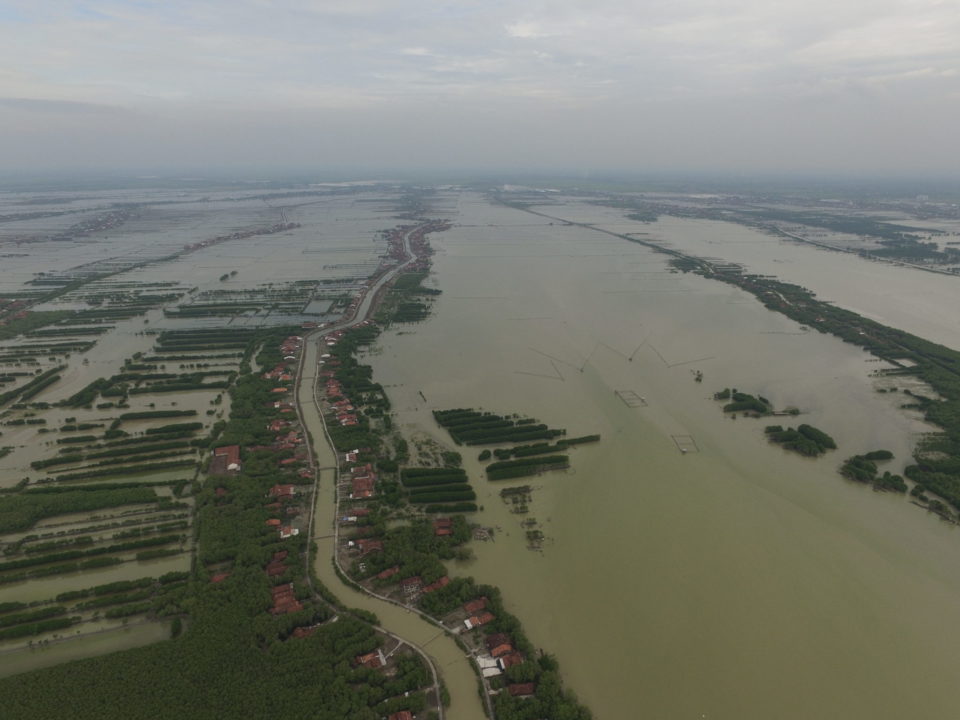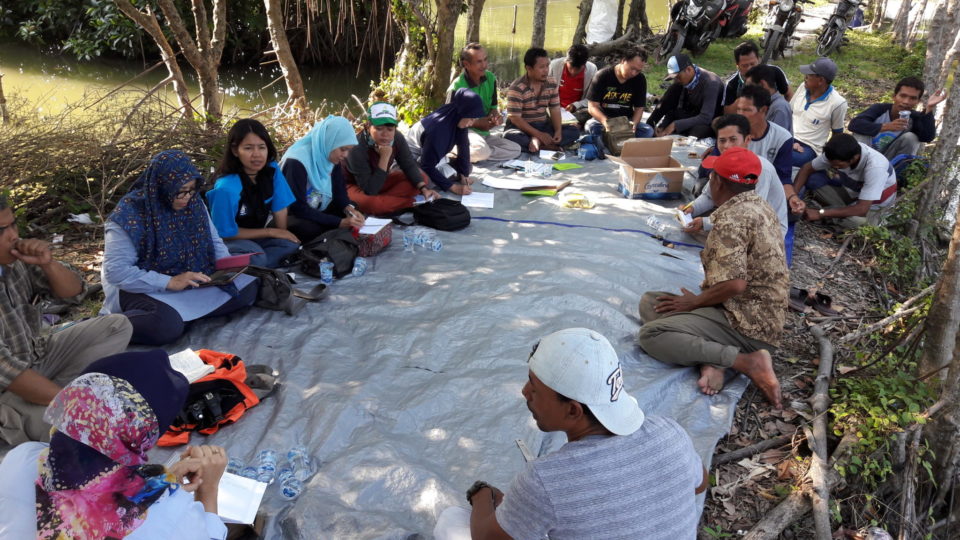
Sustainable aquaculture Demak: shrimp yield tripled and income doubled
-
Aquaculture, fisheries and coastal agriculture
Expanding aquaculture in South East Asia over the last two decades has been the main driver of mangrove loss in the world, says a study published in PLOS One (June 2017) . This makes it one of the most important sectors for a transition towards a more sustainable model. But is it possible to balance mangrove restoration and aquaculture production?
The Building with Nature Indonesia Consortium aims to rebuild the coastal protection along the severely eroded coastline in Demak district by creating space for mangroves while increasing sustainability and productivity of aquaculture. In Demak 70,000 households are losing their livelihoods as their ponds are turning into large tidal lakes as a result of erosion. Two entire villages have already been evacuated. Conversion of mangroves to shrimp farms is one of the main causes, while also groundwater extraction and unsustainable coastal infrastructure development play key roles.

Making space for a mangrove belt: preventing is better than curing
In the Eastern part of Demak ponds are not yet degraded, but are located right at the shoreline and will erode soon if business as usual continues. In these areas the Consortium proposes villagers to move ponds backwards to make space for a wide mangrove belt to protect the land, the houses and the ponds. Some farmers would need to reduce the size of their pond, and others to give up their pond. Those that need to give up their pond for the coastal mangrove belt are assisted to develop new socio-economic activities if wished so. To increase the willingness of the remaining shrimp farmers we provide training.
Adapting to more sustainable and productive methods
In the project area, farmers in Demak are trained through Coastal Field Schools (CFS). This is an existing method, which the Building with Nature Consortium has adjusted with a focus on shrimp farming and mangrove belt recovery; see earlier blog by Blue Forest. Farmers learn critical adaptive thinking to develop, test and implement best practices such as generating farm inputs locally to reduce cost and in an ecologically sound way. The trained villagers pass on their insights through new trainings in other villages with the help of government programs.
Shrimp yield tripled and income doubled
The first monitoring results of 2016 by the Department of Aquaculture of the Faculty of Fisheries & Marine Sciences (FPIK) of the University of Diponegoro (UNDIP) and the Aquaculture and Fisheries group of Wageningen University (WUR), show that the CFS helped the farmers to improve both yield and income: shrimp yield tripled and income doubled.
Lugas Hakim, an Indonesian studying MSc in Wageningen who undertook a social cost benefit analysis in the village of Tambakbulusan in Demak, shows that mangrove recovery is needed to maintain the income from aquaculture. He calculated financial outcomes of various scenarios of coastal development for Tambakbulusan, in which the scenario ‘Business as Usual’ assumes a similar trend as for the district’s area close to Semarang that has become a tidal lake. His results show that replacing part of the ponds with mangroves is highly cost effective, while improving the shrimp production in the remaining ponds almost doubles the impact.
Shrimp disease and floods
Unfortunately, the CFS of the 2nd year started with a setback: in May 2017 several farmers lost their shrimp due to the most common virus and subsequently a floods flushed the ponds. Enforced with a shrimp disease specialist from FPIK, the monitoring team met the CFS facilitators and farmer leaders to discuss the problem and provide recommendations (see picture).

In his next blog, Roel Bosma will discuss the ‘integrated mangrove-shrimp system’, which is being tested by students in Tambakbulusan.
Partners:
The Department of Aquaculture of the Faculty of Fisheries & Marine Sciences (FPIK) of the University of Diponegoro (UNDIP) and the Aquaculture and Fisheries group of Wageningen University (WUR) are both partners to the Building with Nature Indonesia Consortium, as well as part of the PASMI project: Project Aquaculture Supporting Mangrove recovery Indonesia. More information on the PASMI project
Contact persons:
- UNDIP, Ass. Professor Sri Rejeki, [email protected]; Lecturer Restiana Wisnu Ariyati, [email protected]; Lecturer Lestari Lakhsmi Widowati, [email protected]
- Blue Forests-Indonesia, Facilitator Woro Yuniati, [email protected]
